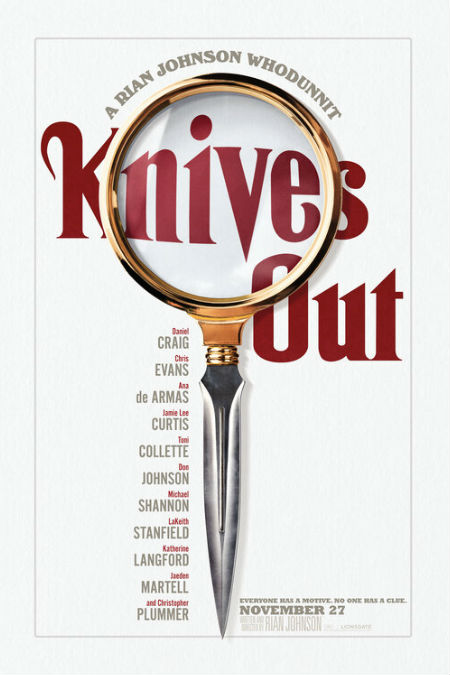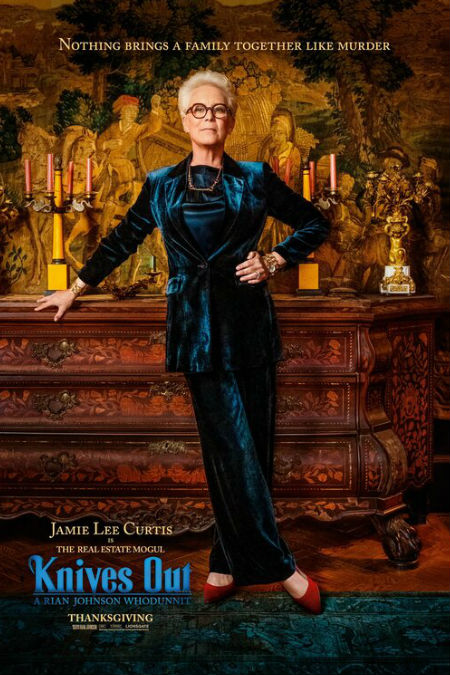
If you think you have seen every possible cinematic permutation of classic whodunnit storytelling, then Knives Out is here to show you that there’s some mileage left yet in this classic genre.
Sporting an exuberantly zestful approach to its narrative that is in evidence even in the more nuanced parts of the story – yes, this is a whodunnit that dares to dial things back when appropriate, something that would no doubt leave Poirot aghast – the film, written and directed by Rian Johnson, makes merry with a giddy slew of murder mystery tropes, effectively telling an engaging and highly-emotionally resonant tale in the process.
It’s most remarkable achievement, apart from spinning a deliciously complicated but not overly so (you don’t need a criminology degree to solve this one you’ll be pleased to know) story of family discord, revenge and betrayal, yep, all the good stuff, is the way it injects a tremendous amount of rich, affecting humanity into proceedings.
While many of the characters are gloriously one-joke and cardboard cutout-y, quite deliberately because they are just chess pieces on Johnson’s exceptionally well-realised board, the protagonist of the moment, in-home care nurse Marta Cabrera (Ana de Armas), is beautifully realised, the one character in the piece, besides possibly the murder victim himself, family patriarch and exceptionally successful mystery writer Harlan Thrombey (Christopher Plummer), who appears to have any sort of conscious or beating heart.
Brought in to care for Harlan, who has serious but not life-threatening health issues, Marta is the epitome of a selfish healthcare worker, providing not just immaculately good care but also unconditional love and friendship, something of which the head of the family is in quite short supply.
His family, though they regularly talk about how close they are, are routinely, passively-aggressively antagonistic to each other, talking a functional familial talk but walking a thoroughly and decidedly dysfunctional one in reality.

The lived-reality behind the incessantly earnest but hilariously insincere PR is immediately obvious to the two law enforcement officials, Trooper Wagner (Noah Segan) and Detective Lieutenant Elliot (Lakeith Stanfield) , investigating the murder or suicide – at the start, it is the latter option most in favour, a deduction that changes markedly as the investigation progresses – and to PR whiz Benoit Blanc (Daniel Craig), a southern private detective whose incisive observations and unwillingness to tolerate the easy assumptions of Wagner and Elliot.
And yet, the family, headed by living siblings “self-made” millionaire Linda, played by Jamie Lee Curtis in archly camp fashion that gorgeously parodies itself (she is married to the adulterous Richard, played by Don Johnson, and mother to narcissistic malcontent playboy Ransom (Chris Evans)), and Walter “Walt” Thrombey (Michael Shannon), who owes his career to daddy employing to run his publishing house (he is married to the desiccated Donna, played by Riki Lindhome, and father to budding Nazi, 16-year-old Jacob, played by Jaeden Martell), are completely and hilariously un-self aware of how they are really coming across.
This complete lack of self-insight is shared by Harlan’s daughter-in-law Joni (Toni Collette), a vapid, New Age-y airhead whose only interest is bilking her father-in-law out of funds additional to those he already shells out on a regular basis for his granddaughter and who feigns care and concern, as do the entire self-obsessed family but whose real motive is purely looking after Number One.
They are in every respect your classic rich blisteringly brutal whodunnit family, only joining Harlan in his giant, haunted house-looking abode which one of the detectives describes as a “Clue board sprung to life, if there is something to be gained.
The only selfless one in the mix is Marta, and yet it is she who ends up caught in the middle of the brouhaha that follows the discovery of Harlan’s bloodied body by housekeeper Fran (Edi Patterson), a development that Jphnson meets with real, poignant humanity than the usual expected slapstick hilarity you might expect.
It’s a genius move.
While the usual expectation with a film like Knives Out, full to the towering and darkened eaves with camply cliched (and yet freshly and zestfully performed by every actor, none of whom comes close to phoning it in) and excitedly over-pitched announcements by Benoit who is the Poirot of the piece, would be flat out farcical comedy, Johnson rather adroitly drop a huge dose of raw, moving humanity into the mix, courtesy of Marta who is genuinely upset and puzzled by the way things go after Harlan’s throat-slit form is discovered.

Marta is the heart and soul of Knives Out, a character who spends much of the film bamboozled and shocked, visibly upset and in mourning, the only character in the only misbegotten Thrombey family – everyone keeps insisting she is loved and a member of the family, although in a running gag that works perfectly every time, no one can get the country she is from right – who seems to really care that Harlan is gone.
Her presence, and de Armas’s pitch-perfect performance, infuse the film with a rawness of experience that you would not normally associate with a film of this kind.
It means that while we get all the expected whodunnit tropes and cliches, though they are all refreshingly differently articulated from what you might expect, we also get a meaningfil heartfelt story that goes far the usual connecting the dots journey to the nig “Ta-dah!” reveal of the murderer.
Johnson has his fun with every last one of the usual suspects elements, and they alone are worth the price of admission, especially given the giddy glee with which the cast attacks them and brings them to life, but what really makes Knives Out stand out is the way there’s some real emotion at stake, a sense that, for Marta at least, this is all a life-changing event.
This masterstroke of characterisation ensures that Knives Out is elevated well above most other whodunnit films, offering a heaping, helping plateful of the usual over the top sleuthing and mystery solving, and of course, the big reveal, but also some delicious black comedy and real humanity, which is so vibrantly and affectingly expressed that what stays with you long after the end of the film, apart from its vivaciously sense of wicked, dark humour, is how these kinds of events can affect a person.
That might sound, on paper, at least, like a real whodunnit joy killer but it has quite the opposite effect instead, enriching Knives Out to such an extent that while you’re eager to know who the killer is, you’re even more excited about where Marta will land after all the emotional and physical chaos of the film, hoping against hope that the one person with a soul in the film gets every last wonderful thing she so richly deserves.